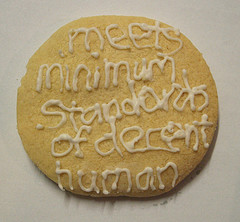[Content Note: Subtle homophobia and derailing tactics.]
I want to continue to comment on Justin Lee’s suggestions on moving forward in the “Gays and Christianity” discussion that he lays out in his book, “Torn: Rescuing the Gospel from the Gays v.s Christians Debate.” A little over a week ago, I looked at Justin’s call for Christians to show more grace, especially in the face of disagreement. I thought that suggestion was spot on and that people needed to simply understand just what showing grace might look like when dealing with LGBT people (not to mention subtle ways Christians can be ungraceful). I find the suggestion I want to cover this week more problematic.
We must educate Christians.
The short answer to this is “No.” The slightly longer answer — and the answer that might cause some readers to stop reading an dismiss everything else to say — is “Fuck that shit!” My purpose for existing is not to educate other people about the issues that are near and dear to my heart. To put it bluntly, if they want to understand the issues that are near and dear to my hear — and if they care about me, they want to do exactly that — they need to educate themselves. Full stop.
Truth be told, there are dozens of resources out there for people to learn about LGBT issues, the things that LGBT people struggle with — both collectively and individually — that these Christians in need of education already have access to. There are hundreds of LGBT bloggers (in fact, Fred Clarke has created a still-growing list of LGBT bloggers who blog from a Christian perspective, and the count on that list is up over 100 alone.) Collectively, those bloggers share personal stories, commentary on political issues that affect LGBT people, cover the latest acts of both ex-gay ministries and anti-gay organizations and how they are harming the LGBT community, and dozens of other topics. All any Christian needs to do to become educated on these matters is open their favorite web browser and submit a few choice words and phrases to their favorite search engine. They will learn all kinds of things.
And yet, Christians aren’t doing this. This suggests to me that they don’t want to be (further) educated on these subjects. So I see no point in wasting a lot of time and energy into doing something for people that those people don’t want — or at least aren’t willing to put any effort into themselves.
Or perhaps some Christians really do want to be educated, but on their terms. Sparky talked about this phenomenon quite succinctly in his post, “Is There a Duty to Educate?“:
When you ask us to educate you and get mad
when we say no, you are not lost and alone in the wilderness, hopelessly
ignorant without any help you find your way out. You are already wallowing
in all the information you need – you just can’t be bother
to take the effort to read it when you can make one of us spoon feed
you.
If Christians want to be educated — and they should — then they need to quit expecting LBGT people to show up at their churches, behave in a certain way, and act as if it’s some great honor to be invited to come talk to the nice Christian folks. They can instead come to those places that we LGBT people find some measure of safety and therefore are already sharing our stories there. They can reach out to us with a humble and honest desire to listen to our stories.
And while they’re at it, they can listen to what we actually say rather than listening just long enough to reconstruct our stories to fit their preferred narrative. (For more thoughts on that phenomenon, see all Shakesville posts labeled “Validity Prism.”) Then can fight the impulse to stop listening or “lighten the mood” when the education (or story telling process) causes them discomfort.
So a big portion of my problem with Justin’s advice is not that I don’t think LGBT people should be telling our stories[1] or engaging with Christians. For the most part, I take issue with the apparent implication that we haven’t already been doing this. We have. The Christians who still need to be “educated” simply aren’t listening, either due to lack of desire on their part or an insistence that we do everything on their terms.
Note:
[1] Though I will note that this is a decision that every LGBT person has to make for themselves and I think many LGBT people have valid reasons not to do this. Sharing one’s story requires a great deal of vulnerability and often has the effect of painting a bright red target on oneself for those who want to take shots, attack, and denigrate. Expecting any particular LGBT person to do that is pretty demanding, so I do take issue with Justin phrasing this suggestion as an unqualified “must.”

